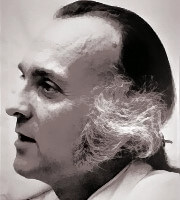About Robert Duncan
Robert Duncan, born January 7, 1919 in Oakland, California, and died February 3, 1988 in San Francisco as a result of polycystic kidney disease, is an American poet, writer, essayist and playwright, associated with the Black Mountain literary movement, the Beat generation and the Western esoteric tradition. He was was a scholar of Hilda Doolittle and was also one of the key figures of the San Francisco Renaissance with Kenneth Rexroth, Robin Blaser, Charles Olson, Robert Creeley, Jack Spicer... and of the American literary avant-garde. Duncan grew up with adoptive parents who were anthroposophists in Oakland and Bakersfield. In 1936 he began studying at the University of California at Berkeley. From there he moved to Black Mountain College in North Carolina in 1938, where he met Robert Creeley and Charles Olson. After a heated argument, he dropped out of college. From 1948 to 1950, Duncan returned to Berkeley to study literature. There he belonged to the group around Lawrence Ferlinghetti, a supporter of the Beat Generation.After the publication of his first book, Heavenly City Earthly City, in 1947, he takes pleasure in playing the role of medium to bring out a literature based on symbolism, occultism, and polytheism, he practices his role as a medium in salons sensitized as much to theosophy as to Dadaism and to surrealism. this role is not just a game for him, it is also the search for the ultimate foundations of human experience and its expression, joining in this the archetypes of C.G. Jung, as he explains in his essay: The Truth & Life of Myth: An Essay in Essential Autobiography published in 1973. One of the examples of this ecstatic poetry by Duncan is The Venice Poem published in 1948, and reissued in 1975, it is a huge poem illustrating the painting of the Custom Officer Rousseau depicting his dreams and the images and words aroused in him by Igor Stravinsky's Symphony in Three Movements, a collage of sound and pictorial sources to form a visionary ensemble. Not only was Duncan a difficult poet, his presence as an intellectual was also felt in many aspects of mass culture. The name Duncan is relevant in the history of gay culture prior to the Stonewall Riots and the rise of the bohemian socialist communities of the 1930s and 1940s, in the Beat Generation and also in the political and cultural turmoil of the 1960s, influencing occult and Gnostic circles weather. However, Robert Duncan refuses to be an antihero or a social rebel, he seeks through experience and poetic expression to promote the inclusion of different worlds, different ways of living. This is how Duncan rejects the idea of the poetry for elites, in favor of poetry as a place of compassion, empathy, dialogue, human fraternity.
The 1960s were the times of national recognition, which is how he was the winner of many prizes: the Harriet Monroe Prize (1961), a Guggenheim Fellowship (1963), the Levinson Prize from Poetry magazine (1964) and three writing grants from the National Endowment for the Arts. In 1985 he received the National Poetry Award. The three of his books that received critical attention were: The Opening of the Field (1960), Roots and Branches (1964), and Bending the Bow (1968). During the latter part of his life Duncan's works, published by City Lights and New Directions, were distributed worldwide and his influence as a poet is evident today in traditional and avant-garde works.
Politically, he was a left-wing anarchist, freed from the dogmas of the American institutional left and not hesitating to make harsh criticisms of it, he is close to other anarchist writers such as Willian Everson and Philip Lamantia and to the union known as the woblies. In 1968, he will sign, with other poets, a manifesto against the policy of the United States government: Poet Power.
Browse all poems and texts published on Robert Duncan









